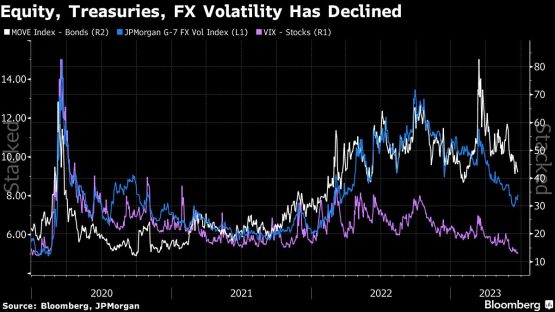From oil and gold to stocks and currencies, global markets were a picture of relative calm Monday in the wake of a geopolitical shock that challenged Vladimir Putin’s rule in Russia.
Oil was steady after its near 4% slide last week, US and European equity futures ticked higher and Asian shares were mixed as bourses in mainland China opened after a long weekend amid concern over the nation’s economic recovery. A gauge of dollar strength declined 0.2% while most major currencies traded within narrow ranges versus the greenback. Gold rose slightly, with little sign of aggressive buying for its haven qualities.
While events in Russia had the potential to spur investors into selling riskier assets, initial moves were modest and reflected the impact of a deal that was brokered to halt the Wagner mercenary group’s advance toward Moscow. The agreement includes dropping criminal mutiny charges against Yevgeny Prigozhin and his fighters.
The situation casts a shadow over the sustainability of the Russian regime, which may start to present problems for markets, according to Adrian Zuercher, head of global asset allocation at UBS Global Wealth Management. “It’s probably another element that creates uncertainty, volatility,” he said on Bloomberg Television. “But we can see market reaction very muted so far.”
Gas traders were bracing for more market turbulence given the risks to supply from Russia, with European gas already seeing the highest volatility since the invasion of Ukraine.
Shares of Russian aluminum producer United Co. Rusal International PJSC, which offer some insight into appetite for the nation’s assets via Hong Kong-traded securities, fell as much as 2.9%. The stock has slumped this year amid trading volumes that have fallen precipitously for the company in Hong Kong.
Yet in broad terms, aside from commodities trades, Russia has largely become cut off from from global financial markets due to sanctions imposed since the invasion, thus limiting the impact on Monday.
Stocks traded higher in Japan, South Korea while those in Hong Kong fluctuated and benchmarks in mainland China, Australia and New Zealand fell.

Futures for the S&P 500 rose around 0.3%, recovering some of the lost ground that saw US stocks notch their worst week since March. Anxiety has been rising in equity markets that central banks will have to ratchet interest rates higher to tamp down inflation, and in the process push the economy into reverse.
Treasury yields were little changed Monday. Bonds rallied in Australia and New Zealand, echoing the moves in Treasuries Friday, when US purchasing managers index data showed a decline to lowest level since December.
The yen strengthened after Japan’s top currency official said he wouldn’t rule out any options to handle currency matters appropriately. The yen last week depreciated to the weakest since November after the softer-than-expected PMI data in both Europe and the US fanned fears the global economy may be succumbing to pressure from higher interest rates.
The offshore yuan fluctuated despite China setting its daily reference rate for the currency at a stronger-than-expected level to slow its slide.
Meanwhile, the S&P 500 Index ended the shortened holiday week 1.4% lower while the Nasdaq 100 benchmark fell 1.3% as investors took profits from the year’s winning technology names. The second-quarter stock rally — fueled by the frenzy for growth-oriented artificial intelligence stocks — is fraying under the threat of more rate hikes and fears that the full economic impact of aggressive central bank policy has yet to be felt.
Federal Reserve Chair Jerome Powell damped the mood last week when he said the US may need one or two more rate increases in 2023. Other Fed commentators pushed back against investor hopes for a rate cut this yea.
Powell has done a good job of reconnecting the bond market with the Fed’s outlook, which is no cuts in the intermediate future, according to Walter Todd, president and chief investment officer at Greenwood Capital. “It’s going to be more kind of data dependent as the Fed will ind of push around the bond market and the stock market going forward,” he said on Bloomberg Radio.
Key events this week:
- US new home sales, durable goods, Conference Board consumer confidence, Tuesday
- ECB President Christine Lagarde speaks at ECB forum in Sintra, Portugal, Tuesday
- China industrial profits, Wednesday
- US wholesale inventories, goods trade balance, Wednesday
- Federal Reserve to unveil results of annual banking industry stress test, Wednesday
- Policy panel with ECB’s Christine Lagarde, Fed Chair Jerome Powell, BOJ’s Kazuo Ueda and BOE’s Andrew Bailey at ECB forum in Sintra, Wednesday
- Sweden rate decision, Thursday
- US GDP, initial jobless claims, Thursday
- Atlanta Fed President Rafael Bostic speaks on the US economic outlook at event in Dublin, Thursday
- China manufacturing PMI, non-manufacturing PMI, Friday
- Eurozone CPI, unemployment, Friday
- Japan unemployment, industrial production, Tokyo CPI, Friday
- US personal income and spending, University of Michigan consumer sentiment, Friday
Some of the main moves in markets:
Stocks
- S&P 500 futures rose 0.3% as of 12:27 p.m. Tokyo time. The S&P 500 fell 0.8% Friday
- Nasdaq 100 futures rose 0.3%. The Nasdaq 100 fell 1%
- Japan’s Topix rose 0.2%
- Australia’s S&P/ASX 200 fell 0.4%
- Hong Kong’s Hang Seng was steady
- The Shanghai Composite fell 0.8%
- Euro Stoxx 50 futures rose 0.4%
Currencies
- The Bloomberg Dollar Spot Index fell 0.2%
- The euro rose 0.1% to $1.0909
- The Japanese yen rose 0.2% to 143.40 per dollar
- The offshore yuan was little changed at 7.2138 per dollar
- The Australian dollar rose 0.2% to $0.6692
Cryptocurrencies
- Bitcoin fell 0.5% to $30,240
- Ether fell 0.9% to $1,878.15
Bonds
- The yield on 10-year Treasuries declined one basis point to 3.72%
- Japan’s 10-year yield was unchanged at 0.365%
- Australia’s 10-year yield declined three basis points to 3.96%
Commodities
- West Texas Intermediate crude was little changed
- Spot gold rose 0.3% to $1 926.55 an ounce
© 2023 Bloomberg


